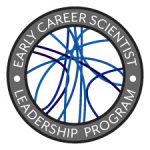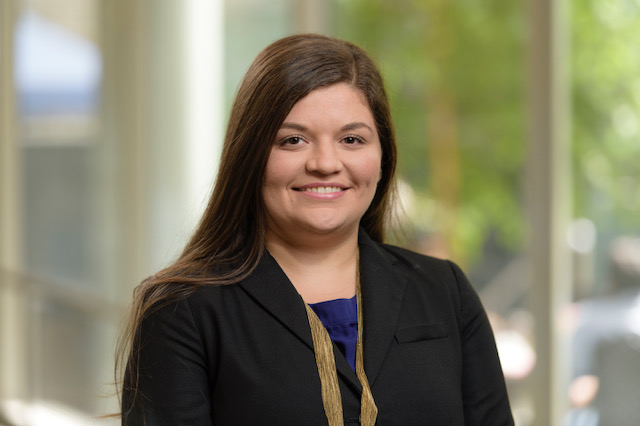 Yaihara Fortis Santiago, Manager of the Office of Postdoctoral Affairs at Memorial Sloan Kettering Cancer Center, discusses her journey from Puerto Rico to discovering a fulfilling career helping early career scientists advance their scientific training and helping them foster cross-institutional relationships.
Yaihara Fortis Santiago, Manager of the Office of Postdoctoral Affairs at Memorial Sloan Kettering Cancer Center, discusses her journey from Puerto Rico to discovering a fulfilling career helping early career scientists advance their scientific training and helping them foster cross-institutional relationships.
In the Decoding Life series, we talk to geneticists with diverse career paths, tracing the many directions possible after research training. This series is brought to you by the GSA Early Career Scientist Career Development Subcommittee.
When did you know you wanted to be a scientist?
I grew up in the rural mountains of Puerto Rico, and I never had access to a real-life scientist. Everything that I knew about science and scientists came from the textbooks. In middle school, I had a fantastic science teacher who was very passionate about what she did, and she made me realize that science existed—and I could do it. She was constantly doing interactive activities in the classroom to explain scientific concepts. That’s when my love for science began. Later during college, I followed in my sister’s footsteps; she was studying chemistry. I ended up doing research in a neuroscience lab somewhat randomly, as I was not looking for research opportunities at that time. I met my sister’s PI, and I grew to know him personally without realizing that he was a scientist. Eventually, I ended up doing research in the same lab as my sister.
Thanks to this early exposure to research in college, I became part of a training grant for underrepresented minority students funded by the National Institutes of Health at the University of Puerto Rico. As part of this program, I participated in two summer internships (Columbia University and NYU) that exposed me to different research questions. Towards the end of my bachelor’s degree, I was confident about applying to grad school.
Who is one person that has helped you to get where you are now, and one person you think you have helped?
As soon as I started doing research, I started cultivating a strong network of mentors. As an undergrad, I identified key people who opened doors and helped me realize my strengths and overcome challenges and obstacles. I would say that my grad school advisor deserves a lot of credit because he always had my back; he pushed me out of my comfort zone and got me out the door with an amazing PhD and great credentials. Peer mentoring has also helped me navigate and advance in a career outside academia.
The same is true for the second part of the question. I have mentored many students over the years, and one thing that gives me a lot of happiness and pride is seeing them achieve their goals. Recently, I have been mentoring one student in particular, and I was ecstatic when I learned that she was selected for the AAAS Science and Technology Policy Fellowship (STPF). Seeing her professional growth over the past four years makes me feel very accomplished as a mentor.
Do you think your AAAS policy fellowship was instrumental in getting you to your current position, and are you working on any policy-related projects?
Training as an AAAS STPF fellow helped me understand the policy landscape and provided opportunities for my professional development. As a fellow, I worked at the National Science Foundation on programs that funded research opportunities for grad students in other countries. Although this was not necessarily policy related, I received all the training they provide on policy, and I got to learn how higher education is managed from a federal perspective. Overall, I would say that the fellowship was important training for what I do today.
After the fellowship, I worked at the New York Academy of Sciences for three years developing programming for early career scientists (undergraduates, graduate students, postdocs, and junior faculty) to help them develop professional skills and navigate their professional journeys. That position allowed me to understand the challenges faced by postdocs and served as a bridge to my current job.
Ten years ago, did you see yourself in your current position?
No! Ten years ago, I was deeply in love with my research project, and I was convinced that my path was carved for me. All I had to do was follow the formula to become an academic. At that time, I don’t think I had a long-term goal; all I wanted was to graduate. The aim was just to become a scientist. In my last two years as a grad student, I was having conversations with my PI about potential labs for a postdoc. However, academia was much different then than it is today, in that only a handful of institutions had offices dedicated to postdoctoral or graduate affairs. Ten years ago, that was an emerging field that I was unaware of.
What does a typical day of work look like for you?
I have a scientific career because I still think about and process information as a scientist. The goal of my current position is to provide support for the postdoctoral community at Memorial Sloan Kettering (MSK). Within this population, there are people with different needs depending on their career aspirations, academic discipline, and cultural background. Therefore, a big component of my job is to understand the institutional policies related to housing, visas, and taxes and to identify resources to better support postdocs during their appointments. I also work with my colleagues to help them develop strong professional skills. Most of the days, I am at my desk responding to emails, reading articles related to workforce development and policy issues, and helping postdocs navigate the complexities of the academic enterprise.
What experiences outside of your scientific training have had the greatest impact on your career?
I think traveling had a great impact on me. As a child, I traveled a lot to different countries. It was a shock to me because as I traveled to these places, I realized my privileges. It forced me to be comfortable in new environments. It also taught me to navigate environments based on social interactions and cultural clues, which is something I think I have taken with me throughout my career. For example, the transition from grad school to being a fellow came with a lot of challenges, but I was very comfortable in the new scenario, and I think that had to do with my prior travel experiences. When I was in grad school, I spent a lot of time doing extracurricular activities that had nothing to do with my science; I also did a lot of mentoring. These activities helped me develop other skills, including how to interact with people with different backgrounds, how to deal with conflicts, and how to help others navigate their own careers.
Are there any additional skills you wish you had learned during your graduate training?
Communication training! I think in grad school we learn how to communicate with our peers using the formula that everyone is using, but I think it would have been helpful to learn a communication style that works for each different audience. I wish I had received formal training on how to convey scientific information to lay audiences, such as kids or family members, and how to adapt to disseminating this information based on the audience. Another is leadership. I think when we make the switch from being a grad student—where we go from consuming knowledge to producing knowledge—there is a big gap. Leadership skills are important to being successful, and I have noticed that as grad students, we’re often trained to follow but not necessarily lead. This is precisely why I created the Science Alliance Leadership Training, which is a leadership program for graduate students at the New York Academy of Sciences.
What skills/qualities do you look for in a person that is considering joining your team?
At MSK, the Office of Postdoctoral Affairs (OPA) is part of a bigger cluster called the Office of Scientific Education and Training (OSET). This cluster was created two years ago in an effort to centralize the administrative support given to postdocs and graduate students. In addition to OPA, the cluster also houses the Office of Career and Professional Development. Our vision is to enhance the academic, collegial and professional experience of trainees at MSK. The qualities for someone interested in joining our team are good communication and interpersonal skills. More importantly, they must understand the different components and expectations of training as a scientist and have a solid background in STEM workforce development.
What advice would you give to a graduate student who would like to pursue a similar career to yours?
While doing your science, you have to develop strong scientific credentials and be committed to the science. Start early in looking at careers that could potentially be a good fit based on your interests, values, and experiences. Do informational interviews, read lots of articles, and research different career options. Get out of the lab and challenge yourself to develop new skills that could potentially build your resume. For example, if you’re interested in policy, meet with your deans and presidents to address issues that affect students on your campus. Get into leadership positions. Self-care is also key! It is important to find a balance between your professional career with your personal life. Clearly define where professional life ends and personal life begins.
Do you have any regrets about your career choices?
No! My scientific journey took me here. If anything, I regret not taking the time to think strategically about my career options after grad school. I used to focus a lot on the “ultimate” goal—getting a PhD—and not on the big picture—developing professional skills that are very marketable. If given the chance to start over, I would have enjoyed the journey and spent more time with my family.
About the author:
![]() Elaine Welch is a liaison on the Early Career Scientist Career Development Committee and is an Associate Human Molecular Geneticist at PreventionGenetics. In addition to her work in clinical genetics, Elaine is committed to mentoring early career scientists—especially those belonging to underrepresented minority groups—to help them successfully transition from academic training to varied career paths.
Elaine Welch is a liaison on the Early Career Scientist Career Development Committee and is an Associate Human Molecular Geneticist at PreventionGenetics. In addition to her work in clinical genetics, Elaine is committed to mentoring early career scientists—especially those belonging to underrepresented minority groups—to help them successfully transition from academic training to varied career paths.
Learn more about the GSA’s Early Career Scientist Leadership Program.













